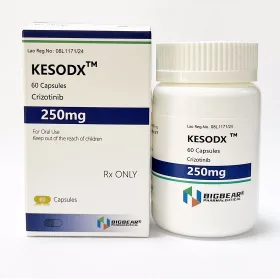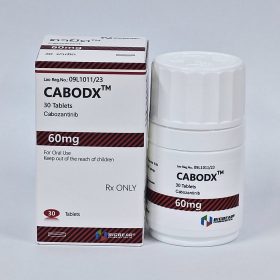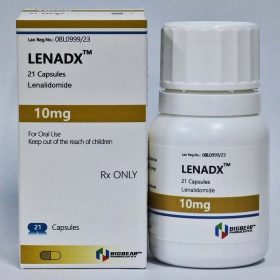- Details
- Description
-
Packaging Size21c/Bottle
-
Strength4mg
-
CompositonPomalidomide
-
TreatmentMultiple myeloma and AIDS-related Kaposi sarcoma
-
FormCapsule
-
BrandPOMMADX 4
-
Quantity Unit4mg*21c/Bottle
-
ManufacturerBIGBEAR Pharma,Laos PDR
About Pomalidomide
Pomalidomide is an anti-cancer medication used for the treatment of multiple myeloma and AIDS-related Kaposi sarcoma. Pomalidomide directly inhibits angiogenesis and myeloma cell growth. This dual effect is central to its activity in myeloma, rather than other pathways such as TNF alpha inhibition, since potent TNF inhibitors including rolipram and pentoxifylline do not inhibit myeloma cell growth or angiogenesis. Upregulation of interferon gamma, IL-2 and IL-10 as well as downregulation of IL-6 have been reported for pomalidomide. These changes may contribute to pomalidomide's anti-angiogenic and anti-myeloma activities.
Multiple Myeloma
Indicated in combination with dexamethasone, for multiple myeloma (MM) in patients who have received at least 2 prior therapies (including lenalidomide and a proteasome inhibitor) and have disease progression on or within 60 days of completion of the last therapy
4 mg PO qDay on Days 1-21 of repeated 28-day cycles until disease progression; give in combination with low-dose dexamethasone
Low-dose dexamethasone
- Give PO only on Days 1, 8, 15, and 22 of each 28-day cycle
- ≤75 years: 40 mg/day
- >75 years: 20 mg/day
Kaposi Sarcoma
- Indicated for AIDS-related KS in patients who failed highly active antiretroviral therapy (HAART)
- 5 mg PO qDay on Days 1-21 of each 28-day cycle
- Continue until disease progression or unacceptable toxicity
- Continue HAART as HIV treatment
KS in adults who are HIV-negative
- Indicated for KS in adults who are HIV-negative
- 5 mg PO qDay on Days 1-21 of each 28-day cycle
- Continue until disease progression or unacceptable toxicity














